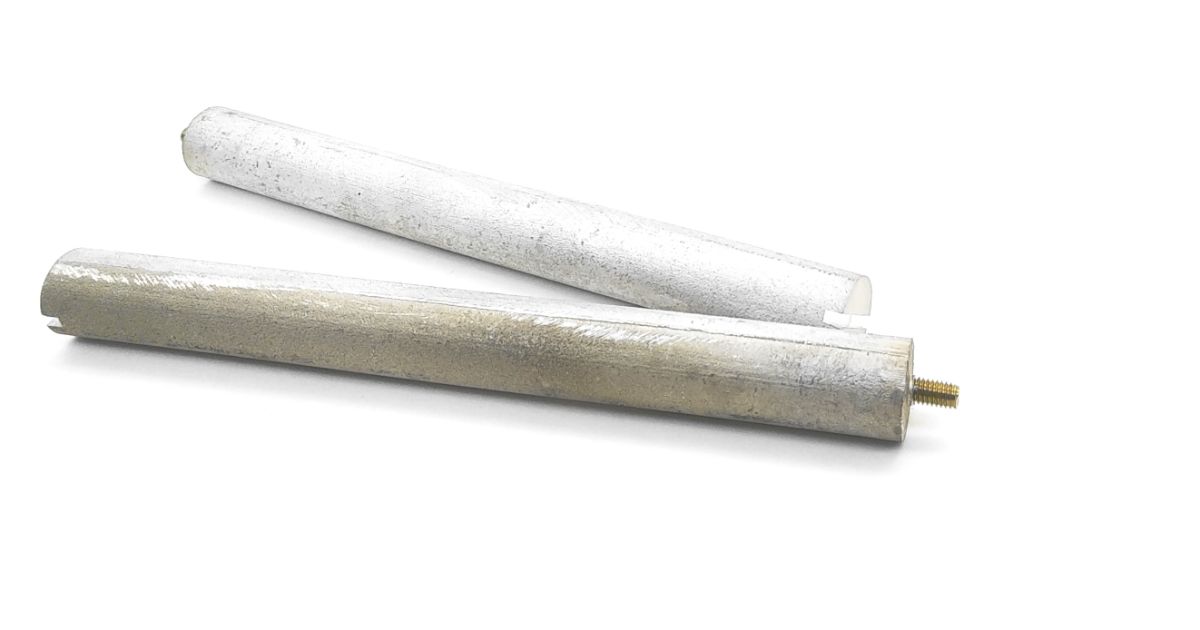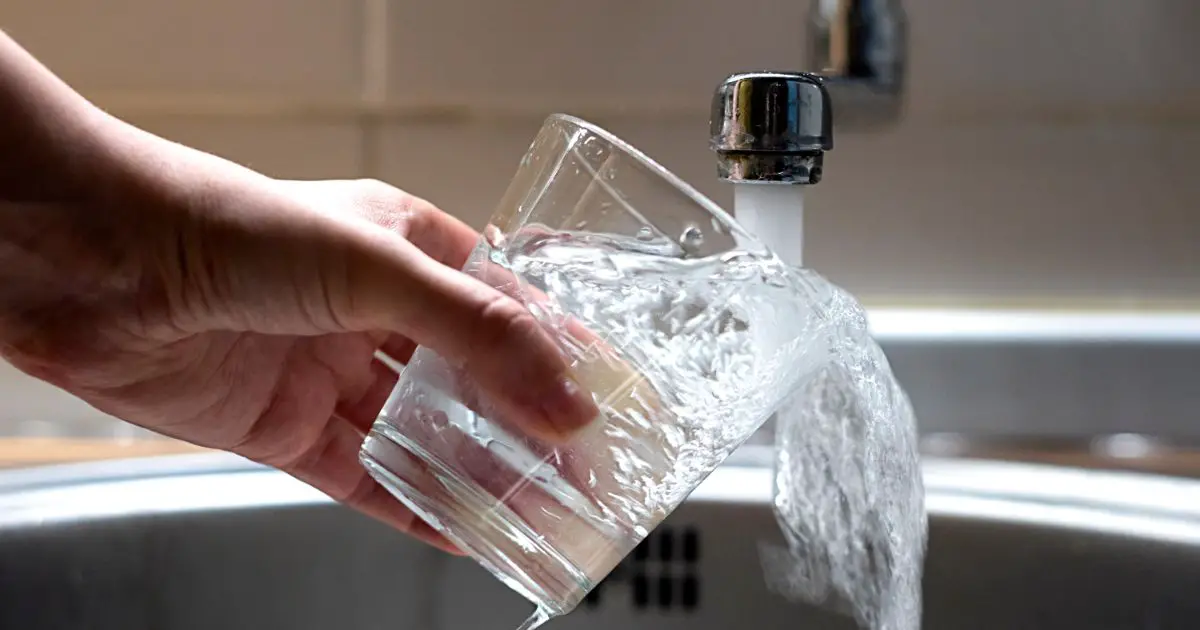Aluminum vs Magnesium Anode Rod: Which is Right for Your Water Heater?
For a standard tank water heater, an anode rod is the first line of defense in the fight against corrosion. If you’ve ever had to replace an anode rod, you’ll know that there are different types of anode rods available that vary depending on the metal used in them. So, what’s the difference between an aluminum vs magnesium anode rod, and which one is the right pick for you?
First, you need to understand what water heater anode rods are and how they work before we discuss their differences. So let’s talk about corrosion’s worst enemy: Anode rods.
Anode Rods

What are Anode Rods?
An anode rod is a metal rod that runs down the tank of your water heater. It is one of the main components of a water heater that helps the system work properly.
Most anode rods are made of either aluminum or magnesium. An anode rod’s main function is to delay corrosion in your steel tank.
How Do Anode Rods Work?
The magic behind this phenomenon can be explained through high-school chemistry. In a corrosive environment, the more reactive metal will rust before the less reactive one does.
That’s why most anode rods are made of highly reactive metals like magnesium and aluminum. As long as the metal is more reactive than iron, which is present in the steel body of your water heater tank, the rod will perform its function.
The heat, acids, and water will be attracted to the anode more than the body of the water heater tank, hence saving it from corrosion. However, this means that once the anode rod in your tank is rusted, the body of the tank is exposed to corrosive elements. Due to this, anode rods need to be changed frequently before any lasting damage is done to the tank.
Aluminum vs Magnesium Anode Rod

Now that we know what anode rods are and how they save your tanks from corrosion, let’s look at the differences between aluminum and magnesium anode rods.
Cost
Aluminum is one of the most abundant metals on our planet. Extracting aluminum and making aluminum rods is not very expensive or difficult, which is why aluminum anode rods can easily be found for roughly $15. Many people opt for aluminum anode rods because of their affordability.
Magnesium is also available naturally in large quantities. However, due to its higher reactivity, it’s more difficult to extract and refine. This causes a stark increase in the price of magnesium anode rods.
Performance
The functionality of both aluminum and magnesium anode rods is good. However, magnesium rods take the cake due to their higher reactivity.
Since aluminum anode rods are less reactive, they are not as effective at combating corrosion as magnesium ones. That’s why many users with aluminum anode rods complain about growing rust in their heaters.
If you want the absolute best performance out of your anode rod, then the safer choice is magnesium.
Lifespan
A silver lining of having less reactivity is that aluminum anode rods tend to last longer. With an aluminum rod installed, you won’t have to open the heater tank as frequently for anode replacement as you will with a magnesium rod.
This makes the aluminum rod more cost-effective as well, because, despite being the cheaper option, it ultimately outlives magnesium.
Smell
Magnesium anode rods can add a rotten-egg smell to the water. When magnesium corrodes, the reaction produces hydrogen sulfide, which is the reason for the bad smell.
There is no such reaction with aluminum rods, so the water remains odor-free. Additionally, zinc present in most aluminum rods is great at neutralizing any unpleasant smells that may find their way into the water.
Installation
The ease of installation of aluminum and magnesium anode rods is not the same. Aluminum rods tend to swell up after they are eroded. While installing a new aluminum anode rod is a straightforward process, removing an older, eroded aluminum rod is not quite as simple. A heavily eroded aluminum rod can swell to such an extent that you’ll have to call a plumber to get it removed from its fixtures.
Alternatively, magnesium rods don’t have this issue, so the replacement procedure is much easier.
If replacing anodes is too tedious for you, you can always opt for atankless heater, which doesn’t require an anode.
Sedimentation
A major issue with aluminum rods is that they produce sedimentation when they erode. This can cause many adverse effects, both for the water pipes in your house, and your body if that water is consumed.
Upon erosion, sediments come to rest at the bottom of a hot water tank. This build-up can cause the heater to run much louder than normal. If this sediment ends up in your body, it can increase the risk of many diseases.
When aluminum corrodes, it produces many byproducts. If these byproducts end up in your plumbing, they can create long-term issues. Aluminum can also produce sticky substances that can ruin water filters and taps in your house.
Magnesium, however, is safe from any such sedimentation. This is also another benefit of tankless heaters – they don’t have an anode that can cause sedimentation.
Health Concerns
There are some serious health concerns associated with aluminum anode rods. Ingesting aluminum sediments can cause potential brain diseases. Aluminum anode rods can also increase the concentration of metal in your water beyond safe limits.
Hardness of Water

A major factor that you should consider when buying an anode is the hardness of the water supply to your home.
What is the Hardness of Water?
The amount of dissolved calcium and magnesium dictates how hard the water is. The higher the concentration of these two elements in the water, the harder it is. Water that has a normal or less-than-normal concentration of these elements is called soft water.
Hard water can be extremely harsh on your plumbing. Over time, limescale build-ups can clog the pipes. Homes with hard water need constant pipe cleaning.
Soft water, on the other hand, lacks calcium, so limestone buildup isn’t an issue. However, soft water can rust metals very quickly, thanks to its lower, acidic pH.
Hard Water
If your house is supplied with hard water, then your best bet would be to opt for an aluminum anode rod. Hard water can be devastating for magnesium rods, and the excess calcium in the water can cause unnecessary limestone buildup on the rod. This negatively affects the efficiency of the rod.
The less reactive aluminum rod is perfect for hard water. It won’t be affected by the excess metal ions in the water and can function at its peak capacity.
Soft Water
For softer, more acidic water, you’re better off opting for a magnesium anode rod. Due to the higher reactivity, a magnesium rod will be better able to withstand the higher corrosive strength of soft water.
If you use an aluminum rod in soft water, it won’t be able to perform as well. The reactivity of aluminum isn’t enough to counteract the corroding elements in soft water and can lead to the tank becoming corroded and rusted.
Which Anode Rod is Right for Your House?
Both aluminum and magnesium have advantages and drawbacks. Ultimately, it comes down to which factor you prioritize more. The cheapest option would be to go with an aluminum anode. However, if you’re more concerned for your health, then a magnesium anode is the safer choice.
The primary factor to consider is the hardness of the water in your house.
Pros and Cons for Each Material
Aluminum
- Cheaper
- Lasts longer than magnesium
- Can handle hard water better
- Difficult to install
- Causes sediment build up in the tank
- Doesn’t perform as well as magnesium
Magnesium
- Performs much better than aluminum
- Easy to install
- Can handle soft water better
- Expensive
- Doesn’t last as long as aluminum
- Can result in bad smells in the water
Conclusion
Now that you know the comparison of aluminum vs magnesium anode rod, you can make a more informed decision when buying one.
An anode rod is the best purchase you can make for your water heater. It can increase the longevity of your water heater, and even provide added health benefits. Always consider the discussed factors before you invest in either type of anode.
Alternatively, you can opt for a tankless water heater for your large family and skip the hassle of having to choose an anode. They are more modern and function just as well as a tank-style heater, if not better.
With years of experience under his belt, Adam decided to put his water heater knowledge to work. By providing high-quality content and expert guides, Adam hopes to help anyone looking for expert water heater advice.
